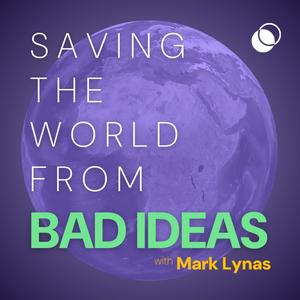Can we really solve climate change just by fixing energy — and ignore food?
In this episode of Saving the World from Bad Ideas, Mark Lynas sits down with Bruce Friedrich, founder and President of the Good Food Institute, to tackle Bad Idea #37: “Solving energy is enough for solving climate.”
Bruce argues that focusing exclusively on decarbonising energy while ignoring food systems is one of the biggest blind spots in climate policy.
From antibiotic resistance and zoonotic disease to geopolitics, national security, and the S-curve of technological change, this conversation makes the case that the protein transition must stand alongside the energy transition if we’re serious about saving the planet.
🧠 Topics Discussed:
● ⚡ Why decarbonising energy alone only solves about half the climate problem
● 🍖 Global meat demand: why “eat less meat” has never worked
● 🌍 Land use, deforestation, and rewilding at planetary scale ● 🧫 Cultivated meat, fermentation, and next-generation plant proteins
● 📉 The inefficiency of feeding crops to animals
● 🦠 Antibiotic resistance and industrial animal agriculture
● 🦆 Pandemic risk and zoonotic spillover from livestock systems
● 🐟 Cultivated seafood and the future of ocean recovery
● 📈 The protein S-curve and lessons from solar, EVs, and the internet
● 🏛️ Why government support matters — and where it’s already happening
● 🇨🇳🇮🇳 China, India, and the geopolitics of alternative proteins
● 🌱 Farmers, land sparing, and the future of agriculture
● 🌎 Food security, resilience, and feeding a growing world
👨🏫 Guest Bio:
Bruce Friedrich is the founder and President of the Good Food Institute (GFI), a global non-profit accelerating the transition to alternative proteins. He has worked for more than three decades at the intersection of food, climate, and innovation. Bruce is the author of Meat: How the Next Agricultural Revolution Will Transform Humanity’s Favorite Food and Our Future, and a leading global advocate for plant-based, fermentation-derived, and cultivated meat as climate, biodiversity, and food-security solutions.
📚 Recommended Reading & Resources:
● Meat: How the Next Agricultural Revolution Will Transform Humanity’s Favorite Food and Our Future
● Good Food Institute
● GFI Europe
● SYSTEMIQ & Good Food Institute – The Protein Transition: Pathways to Lower Climate, Land, and Water Impacts
● What’s Cooking? (UNEP alternative proteins report)
● Livestock’s Long Shadow (FAO)
● World Resources Institute: Creating a Sustainable Food Future
● IIASA land-use & food systems research
● Our World in Data: Meat and dairy production
● UNEP & ILRI: Preventing the Next Pandemic
💬 Quote Highlights:
“Focusing on energy alone while ignoring food is like lifting your foot off the accelerator — but keeping it on the highway to hell.”
“If alternative proteins reach 50%, we could free more land than the entire Amazon rainforest.”
“People aren’t going to give up meat — so we need to change how meat is made.”
“This isn’t a moral problem. It’s a science and engineering problem.”
“The protein transition is one of the most tractable climate solutions we have.”
🌐 About WePlanet:WePlanet is a global citizen and science movement challenging bad ideas and championing evidence-based solutions for climate, nature, and human well-being. Learn more at https://weplanet.org
📥 Join the Conversation:
💬 Feedback or questions? Email:
[email protected] 📩 Subscribe to new episodes: https://weplanet.org/podcast
👁️ Follow us on X/Twitter: https://twitter.com/weplanetint


